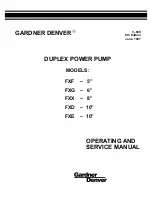
28
7 SERIES 700A11 INSTALLATION MANUAL
have the cooling airflow adjustment applied. In all cooling
operations, the reversing valve directly tracks the O input.
Thus, anytime the O input is present, the reversing valve
will be energized.
Blower (G)
- The blower will start immediately upon
receiving a thermostat G command. If there are no other
commands from the thermostat the variable speed ECM
will run on low speed until the G command is removed.
Regardless of blower input (G) from the thermostat, the
blower will remain on low speed for 30 seconds at the end
of each heating, cooling, and emergency heat cycle.
Emergency Shutdown
- Four (4) seconds after a valid ES
input, P2-7 is present, all control outputs will be turned off
and remain off until the emergency shutdown input is no
longer present. The first time that the compressor is started
after the control exits the emergency shutdown mode,
there will be an anti-short cycle delay followed by a random
start delay. Input must be tied to common to activate.
Continuous Blower Operation
- The blower output will
be energized any time the control has a G input present,
unless the control has an emergency shutdown input
present. The blower output will be turned off when G input
is removed.
Load Shed
- The LS input disables all outputs with the
exception of the blower output. When the LS input has been
cleared, the anti-short cycle timer and random start timer
will be initiated. Input must be tied to common to activate.
Aurora Advanced VS Control LED Displays
These three LEDs display the status, configuration, and
fault codes for the control. These can also be read in plain
English via the Aurora AID Tool. See the LED tables for
further explanation.
Aurora Interface and Diagnostics (AID) Tool
The Aurora Interface and
Diagnostics (AID) Tool is
a device that is a member
of the Aurora network.
The AID Tool is used to
troubleshoot equipment
which uses the Aurora
control via Modbus RTU
communication. The AID
Tool provides diagnostics,
fault management, variable speed ECM setup, and system
configuration capabilities to the Aurora family of controls.
An AID Tool is recommended, although not required, for
variable speed ECM airflow settings. The AID Tool simply
plugs into the exterior of the cabinet in the AID Tool port.
Status LED (LED3, Green)
Description of Operation
Fault LED, Green
Normal Mode
ON
Control is Non-functional
OFF
Test Mode
Slow Flash
Lockout Active
Fast Flash
Dehumidification Mode
Flash Code 2
Load Shed
Flash Code 5
Emergency Shutdown
Flash Code 6
On Peak Mode
Flash Code 7
Warning! VS Derated
Flash Code 8
Warning! VS SafeMode
Flash Code 9
Configuration LED (LED2, Yellow)
Description of Operation
Configuration LED, Yellow
No Software Overwritten
ECM Setting
DIP Switch Overwritten
Slow Flash
ECM Configuration Mode
Fast Flash
Reset Configuration Mode
OFF
The Aurora Advanced VS Control System cont.
Summary of Contents for 700A11
Page 2: ......
















































